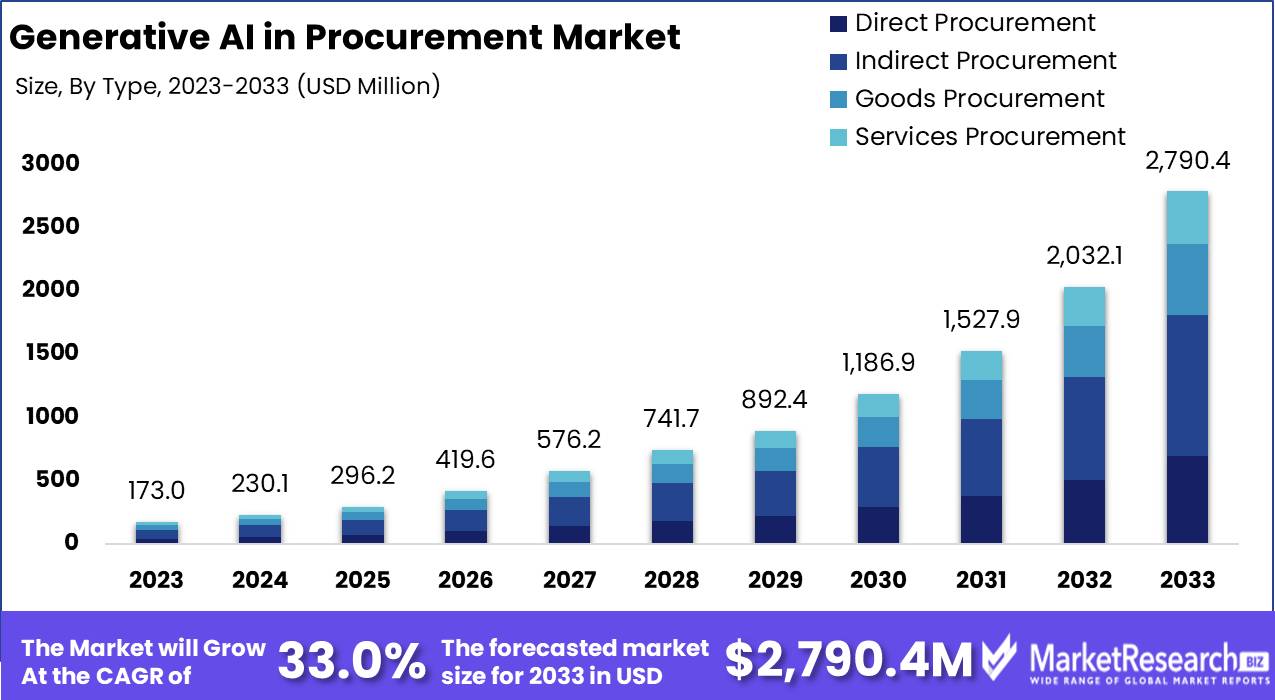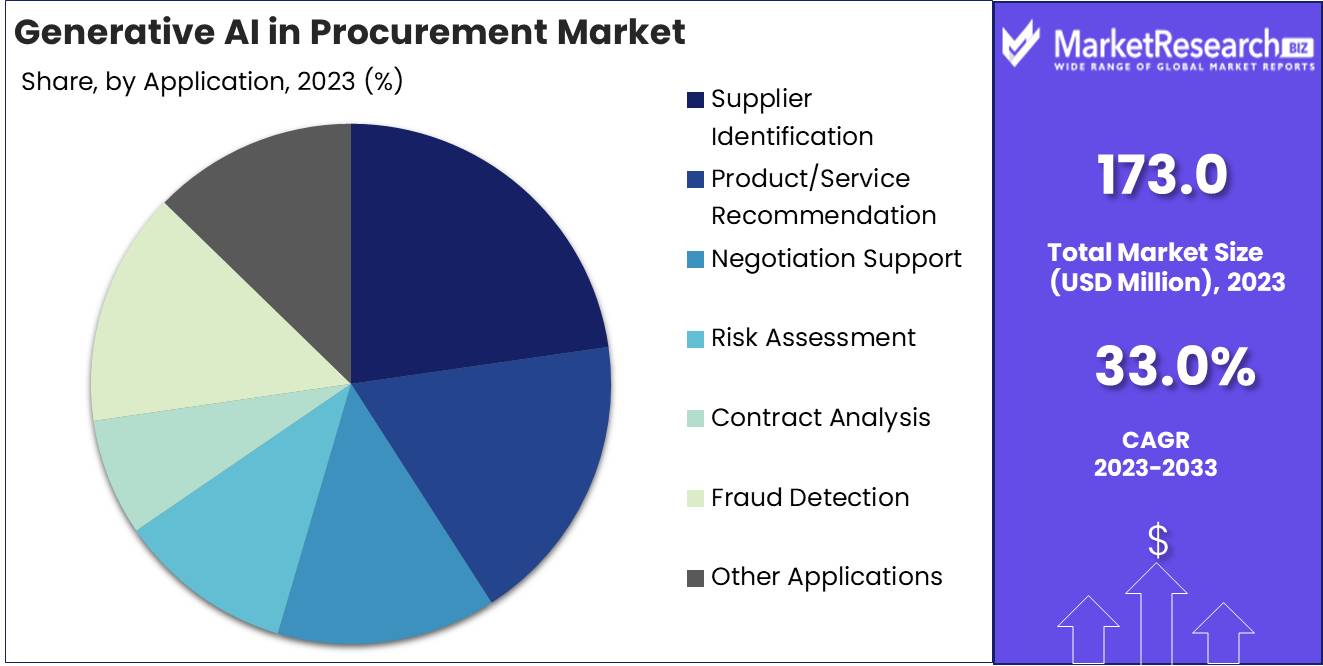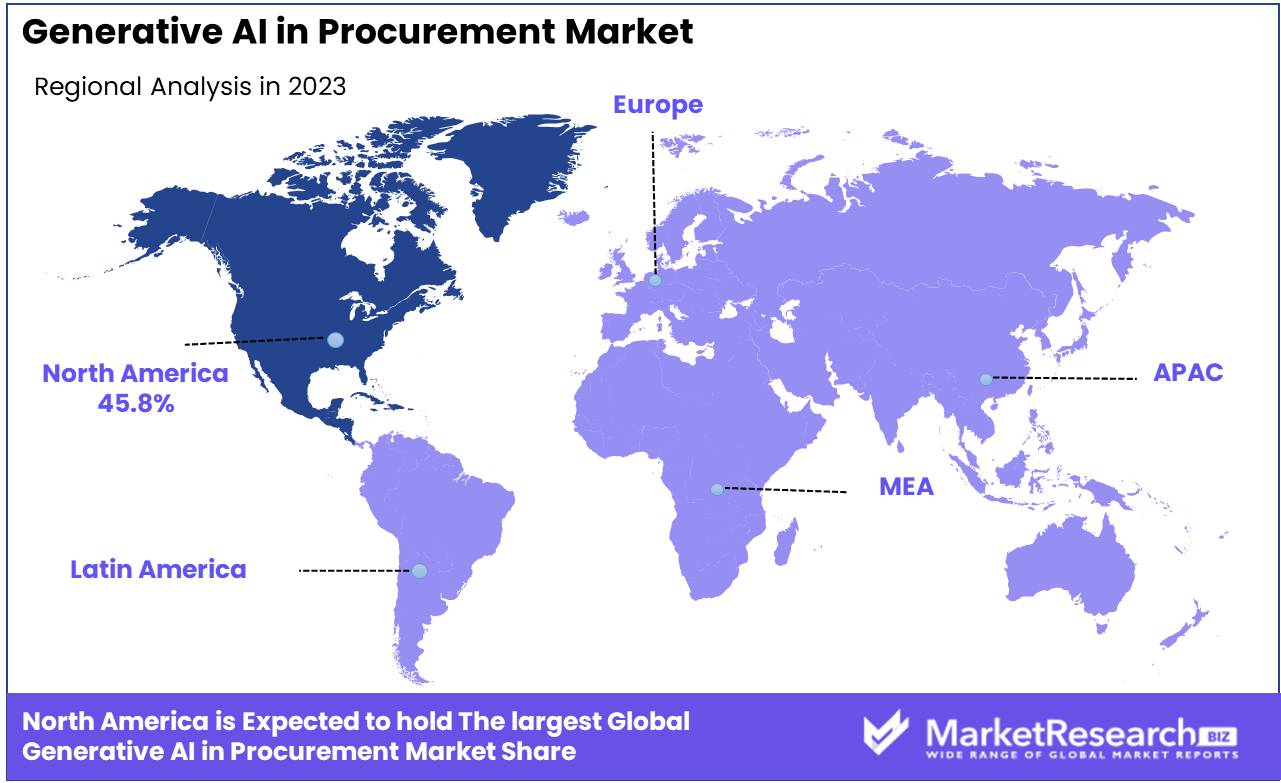
Generative AI in Procurement Market By Type (Direct Procurement, Indirect Procurement, Goods Procurement, Services Procurement), By Application (Supplier Identification, Product/Service Recommendation, Negotiation Support, Risk Assessment, Contract Analysis, Fraud Detection, Predictive Modeling, Other Applications), By Region and Companies - Industry Segment Outlook, Market Assessment, Competition Scenario, Trends and Forecast 2024-2033
-
37655
-
Aug 2024
-
159
-
-
This report was compiled by Vishwa Gaul Vishwa is an experienced market research and consulting professional with over 8 years of expertise in the ICT industry, contributing to over 700 reports across telecommunications, software, hardware, and digital solutions. Correspondence Team Lead- ICT Linkedin | Detailed Market research Methodology Our methodology involves a mix of primary research, including interviews with leading mental health experts, and secondary research from reputable medical journals and databases. View Detailed Methodology Page
-
Quick Navigation
Report Overview
The Global Generative AI in Procurement Market was valued at USD 173 Mn in 2023. It is expected to reach USD 2790.4 Mn by 2033, with a CAGR of 33% during the forecast period from 2024 to 2033.
The Generative AI in Procurement Market focuses on the application of AI technologies to enhance procurement processes, including supplier selection, contract management, and spend analysis. This market leverages AI to generate insights, automate routine tasks, and optimize decision-making, thereby increasing efficiency and reducing costs. Growth is driven by advancements in AI, increasing data availability, and the need for improved procurement performance. Leading firms are integrating generative AI to streamline operations and enhance strategic sourcing, contributing to a more agile and responsive procurement function.

The Generative AI in Procurement Market is experiencing robust growth, driven by the imperative for organizations to enhance efficiency and strategic decision-making in their procurement processes. Generative AI technologies are being increasingly adopted to automate routine tasks, generate actionable insights, and optimize supplier relationships. Zycus, for instance, has introduced Merlin GenAI innovations, including the Merlin Assist Chatbot and Power Apps, which significantly enhance procurement efficiency and integration. These tools streamline workflows, reduce manual intervention, and improve data accuracy, thereby enabling procurement professionals to focus on more strategic activities.
Coupa, serving over 2,000 customers globally, including numerous Fortune 500 companies, exemplifies the extensive reach and data-driven approach essential for training generative AI models. Coupa’s platform aggregates vast amounts of procurement data, providing a robust foundation for AI algorithms to generate precise and insightful recommendations. This capability is crucial for organizations aiming to leverage data-driven strategies to optimize their procurement operations.
The market's growth trajectory is also supported by continuous advancements in AI technology and the increasing availability of data. Organizations are recognizing the value of integrating generative AI to achieve cost savings, improve supplier management, and enhance overall procurement performance. The ability to analyze large datasets and generate predictive insights allows procurement teams to make more informed and strategic decisions, fostering a competitive advantage.
Key Takeaways
- Market Value: The Global Generative AI in Procurement Market was valued at USD 173 Mn in 2023. It is expected to reach USD 2790.4 Mn by 2033, with a CAGR of 33% during the forecast period from 2024 to 2033.
- By Type: Indirect Procurement represents 40% of the market, focusing on non-production related purchases.
- By Application: Supplier Identification constitutes 25%, essential for optimizing procurement processes and supplier relationships.
- Regional Dominance: North America leads with a 45.8% market share, driven by advanced procurement technologies and practices.
- Growth Opportunity: Integrating AI for predictive analytics and risk management in procurement can enhance decision-making and efficiency.
Driving factors
Increasing Demand for Efficient Supply Chain Management
The increasing demand for efficient supply chain management is a major driver of the generative AI in procurement market. Businesses are continually seeking ways to optimize their supply chains to improve performance, reduce delays, and ensure the timely delivery of goods. Generative AI enhances supply chain management by automating complex processes, predicting demand, and optimizing inventory levels.
This technology allows procurement professionals to make data-driven decisions, leading to more efficient and resilient supply chains. By leveraging AI, companies can better manage supplier relationships, mitigate risks, and adapt to market fluctuations, significantly boosting the demand for generative AI solutions in procurement.
Advancements in AI and Machine Learning
Advancements in AI and machine learning are crucial in driving the growth of the generative AI in procurement market. Continuous improvements in these technologies enable the development of more sophisticated AI models that can handle complex procurement tasks, such as contract management, supplier evaluation, and strategic sourcing. Machine learning development algorithms can analyze vast amounts of procurement data to identify patterns, predict outcomes, and provide actionable insights.
These technological advancements not only enhance the capabilities and accuracy of generative AI tools but also make them more accessible and user-friendly for procurement professionals. As AI and machine learning technologies evolve, they expand the potential applications of generative AI in procurement, fostering market growth and innovation.
Growing Focus on Cost Reduction and Efficiency
The growing focus on cost reduction and efficiency is another key factor contributing to the growth of the generative AI in procurement market. Businesses are under constant pressure to reduce operational costs and improve efficiency to remain competitive. Generative AI helps achieve these goals by automating repetitive and time-consuming tasks, such as order processing, invoice management, and compliance monitoring.
By streamlining procurement processes, AI reduces the need for manual intervention, minimizing errors and lowering operational costs. AI-driven insights enable better negotiation and supplier management, leading to cost savings and improved procurement outcomes. The emphasis on cost reduction and operational efficiency drives the adoption of generative AI in procurement, accelerating market growth.
Restraining Factors
High Implementation and Integration Costs
High implementation and integration costs present significant challenges to the growth of the generative AI in procurement market. The development, deployment, and integration of advanced generative AI systems require substantial financial investment in technology, infrastructure, and skilled personnel. Smaller businesses or organizations with limited budgets may find it economically prohibitive to adopt these sophisticated tools, limiting market accessibility.
The ongoing expenses associated with maintaining and updating AI systems can further strain financial resources. This economic barrier slows down the adoption rate of generative AI technologies, particularly among small to medium-sized enterprises (SMEs). To overcome this restraint, the market needs more cost-effective solutions and scalable AI models that can cater to a wider range of businesses.
Concerns Over Data Security and AI Ethics
Concerns over data security and AI ethics present another significant challenge to the generative AI in procurement market. The reliance on large datasets for AI-driven insights and decision-making raises issues related to data privacy and security. Procurement data often includes sensitive information, such as supplier contracts and pricing details, which must be protected from breaches and unauthorized access.
Ethical concerns regarding AI decision-making processes, potential biases in algorithms, and the transparency of AI systems can create hesitation among businesses considering AI adoption. Ensuring robust data security measures and addressing ethical issues are crucial for building trust and fostering broader acceptance of generative AI solutions in procurement.
By Type Analysis
Indirect Procurement held a dominant market position in the By Type segment of the Generative AI in Procurement Market, capturing more than a 40% share.
In 2023, Indirect Procurement held a dominant market position in the By Type segment of the Generative AI in Procurement Market, capturing more than a 40% share. Indirect procurement, which includes the purchase of goods and services that are not directly incorporated into a company's final product, benefits significantly from generative AI technologies. AI-driven solutions streamline processes such as supplier management, contract negotiation, and spend analysis, leading to cost savings and operational efficiency. The complexity and diversity of indirect procurement categories make it an ideal application for generative AI, driving its substantial market share.
Direct Procurement, involving the acquisition of raw materials and components used directly in production, also leverages generative AI for enhancing supply chain visibility and optimizing procurement strategies. While critical, direct procurement holds a smaller share due to its more straightforward, volume-driven nature compared to the nuanced requirements of indirect procurement.
Goods Procurement focuses on the procurement of tangible items, and Services Procurement pertains to the acquisition of services such as consulting, maintenance, and IT support. Both types utilize generative AI to improve procurement processes, although their market shares are less dominant compared to indirect procurement due to their specialized focus.
By Application Analysis
Supplier Identification held a dominant market position in the By Application segment of the Generative AI in Procurement Market, capturing more than a 25% share.
In 2023, Supplier Identification held a dominant market position in the By Application segment of the Generative AI in Procurement Market, capturing more than a 25% share. Generative AI enhances the supplier identification process by analyzing large datasets to identify potential suppliers, evaluate their performance, and match them with procurement needs efficiently. This capability is crucial for optimizing supply chains, reducing costs, and ensuring quality and reliability, which explains its leading position in the market.
Product/Service Recommendation uses AI to suggest optimal products or services based on historical data and procurement patterns, aiding in decision-making and ensuring best value for money. This application is growing in importance as organizations seek to streamline procurement operations.
Negotiation Support involves using AI to analyze past negotiations, market trends, and supplier performance to provide strategic insights during procurement negotiations. This enhances the bargaining power of procurement teams, though it currently holds a smaller share compared to supplier identification.
Risk Assessment is critical in identifying potential risks in the supply chain, such as supplier insolvency or geopolitical instability. AI-driven risk assessment tools enable proactive management of procurement risks, contributing significantly to market growth.
Contract Analysis leverages AI to review and analyze contract manufacturing terms, ensuring compliance and identifying potential issues. This application is essential for managing complex procurement contracts but holds a smaller market share due to its specialized nature.
Fraud Detection uses AI to detect anomalies and potential fraud in procurement transactions, safeguarding organizational resources. Its importance is growing, particularly in sectors prone to procurement fraud.
Predictive Modeling uses artificial intelligence (AI) to forecast future procurement needs and market trends, enabling more strategic and efficient procurement planning. This application is becoming increasingly valuable but holds a smaller share compared to supplier identification.
Other Applications encompass various AI-driven solutions that enhance different aspects of the procurement process, contributing to overall market growth. These include spend analysis, demand forecasting, and procurement automation, each playing a role in modernizing and optimizing procurement practices.

Key Market Segments
By Type
- Direct Procurement
- Indirect Procurement
- Goods Procurement
- Services Procurement
By Application
- Supplier Identification
- Product/Service Recommendation
- Negotiation Support
- Risk Assessment
- Contract Analysis
- Fraud Detection
- Predictive Modeling
- Other Applications
Growth Opportunity
Development of AI-Driven Supplier Management Solutions
The development of AI-driven supplier management solutions represents a significant growth opportunity for the generative AI in procurement market in 2024. These solutions leverage advanced AI algorithms to analyze supplier performance, predict potential risks, and optimize supplier selection processes. By providing deeper insights into supplier capabilities and market dynamics, AI-driven tools enable procurement professionals to make more informed decisions and foster stronger supplier relationships.
This innovation not only enhances operational efficiency but also helps mitigate risks associated with supplier reliability and quality. As businesses increasingly adopt AI for supplier management, the demand for generative AI solutions in procurement is expected to rise, driving market growth.
Expansion in Automated Procurement Processes
The expansion in automated procurement processes offers another promising opportunity for the generative AI in procurement market. Automation powered by AI can significantly streamline various procurement tasks, such as order processing, contract management, and compliance monitoring. By automating these routine and time-consuming activities, businesses can reduce manual intervention, minimize errors, and enhance operational efficiency.
AI-driven automation also allows procurement teams to focus on strategic activities, such as negotiation and supplier relationship management, thereby adding more value to the organization. As the benefits of automation become more apparent, the adoption of generative AI tools for procurement processes is set to increase, further propelling market growth.
Latest Trends
Use of AI for Predictive Analytics in Procurement
The use of AI for predictive analytics in procurement is a key trend driving the market in 2024. Predictive analytics leverages AI algorithms to analyze historical data, identify patterns, and forecast future outcomes. In procurement, this capability allows organizations to anticipate market trends, demand fluctuations, and supplier performance, leading to more informed decision-making.
By predicting potential disruptions and opportunities, companies can optimize their procurement strategies, reduce risks, and improve supply chain resilience. The adoption of predictive analytics helps procurement teams to be proactive rather than reactive, enabling better planning and strategic sourcing. As businesses increasingly recognize the value of data-driven insights, the integration of predictive analytics in procurement processes is expected to grow, driving market expansion.
Integration with ERP Systems for Streamlined Operations
The integration of generative AI with Enterprise Resource Planning (ERP) systems represents another significant trend in the generative AI in procurement market for 2024. ERP systems centralize and streamline business processes, providing a unified platform for managing various functions, including procurement. By incorporating AI capabilities into ERP systems, organizations can automate and optimize procurement workflows, from purchase order creation to supplier management and invoice processing.
This integration ensures seamless data flow across departments, enhances visibility into procurement activities, and improves overall operational efficiency. The synergy between AI and ERP systems enables real-time decision-making and reduces manual intervention, leading to cost savings and improved accuracy. As companies seek to enhance their operational efficiency, the integration of AI with ERP systems is set to become more prevalent, driving further growth in the market.
Regional Analysis
North America held a dominant market position in the Generative AI in Procurement Market, capturing more than a 45.8% share.
The North America region dominated the Generative AI in Procurement Market in 2023, capturing more than a 45.8% share. This dominance is driven by the advanced technological infrastructure, high adoption rates of AI in procurement processes, and significant investments in AI-driven procurement solutions. The U.S., in particular, is a major contributor, with numerous tech companies and startups developing innovative AI procurement tools. The increasing need for efficiency and cost savings in procurement further drives market growth in North America.
Europe follows closely, with a strong focus on AI innovation and digital transformation in procurement. Countries like Germany, the UK, and France are investing heavily in AI technologies to enhance their procurement capabilities.
The Asia Pacific region is experiencing rapid growth in the generative AI in procurement market, driven by significant investments in AI research and development. Countries like China, Japan, and India are leading the adoption of AI-driven procurement technologies.
In the Middle East & Africa, the generative AI in procurement market is emerging, with growing interest in AI-driven procurement solutions. Countries in the Middle East, such as the UAE and Saudi Arabia, are making significant investments in AI to drive economic growth and innovation.
Latin America is steadily adopting generative AI in procurement, with countries like Brazil and Mexico leading the market. The increasing digitalization and the growing demand for AI-driven procurement solutions across various industries are driving market growth in the region.

Key Regions and Countries
North America
- US
- Canada
- Mexico
Western Europe
- Germany
- France
- The UK
- Spain
- Italy
- Portugal
- Ireland
- Austria
- Switzerland
- Benelux
- Nordic
- Rest of Western Europe
Eastern Europe
- Russia
- Poland
- The Czech Republic
- Greece
- Rest of Eastern Europe
APAC
- China
- Japan
- South Korea
- India
- Australia & New Zealand
- Indonesia
- Malaysia
- Philippines
- Singapore
- Thailand
- Vietnam
- Rest of APAC
Latin America
- Brazil
- Colombia
- Chile
- Argentina
- Costa Rica
- Rest of Latin America
Middle East & Africa
- Algeria
- Egypt
- Israel
- Kuwait
- Nigeria
- Saudi Arabia
- South Africa
- Turkey
- United Arab Emirates
- Rest of MEA
Key Players Analysis
Microsoft's AI capabilities enhance procurement processes through predictive analytics and automation. Its Azure cloud platform provides scalable AI solutions, positioning it as a key market player.
IBM's Watson AI platform delivers advanced generative AI solutions for procurement, enabling data-driven decision-making and process optimization. Its robust AI infrastructure ensures IBM’s prominent position in the market.
Google’s AI expertise facilitates efficient procurement processes through machine learning and data analytics. Its innovative AI solutions drive significant advancements in the procurement market.
AWS provides comprehensive AI tools for procurement, enabling automation and optimization of procurement activities. Its scalable cloud infrastructure enhances its market position.
Adobe’s AI-powered solutions streamline procurement processes through advanced analytics and automation. Its focus on efficiency and data-driven insights positions Adobe as a key player in the market.
Companies like Air Products & Chemicals, Inc., Synthesis AI, Genie AI Ltd., MOSTLY AI Inc., and Open AI contribute to the generative AI in procurement market. Their innovative solutions and continuous advancements drive the market's growth and transformation.
Market Key Players
- IBM Corporation
- SAP SE
- Oracle Corporation
- GEP Worldwide
- Coupa Software Inc.
- Microsoft Corporation
- Other Key Players
Recent Development
- In May 2024, Synthesis AI secured $30 million in funding to develop advanced generative AI solutions for procurement. This funding will support research and development efforts to enhance procurement processes.
- In January 2024, Microsoft Corporation introduced an AI-powered procurement solution that uses generative AI to optimize supplier selection and contract management. This solution aims to reduce procurement costs by 15%.
Report Scope
Report Features Description Market Value (2023) USD 173 Mn Forecast Revenue (2033) USD 2790.4 Mn CAGR (2024-2033) 33% Base Year for Estimation 2023 Historic Period 2018-2023 Forecast Period 2024-2033 Report Coverage Revenue Forecast, Market Dynamics, Competitive Landscape, Recent Developments Segments Covered By Type (Direct Procurement, Indirect Procurement, Goods Procurement, Services Procurement), By Application (Supplier Identification, Product/Service Recommendation, Negotiation Support, Risk Assessment, Contract Analysis, Fraud Detection, Predictive Modeling, Other Applications) Regional Analysis North America - The US, Canada, & Mexico; Western Europe - Germany, France, The UK, Spain, Italy, Portugal, Ireland, Austria, Switzerland, Benelux, Nordic, & Rest of Western Europe; Eastern Europe - Russia, Poland, The Czech Republic, Greece, & Rest of Eastern Europe; APAC - China, Japan, South Korea, India, Australia & New Zealand, Indonesia, Malaysia, Philippines, Singapore, Thailand, Vietnam, & Rest of APAC; Latin America - Brazil, Colombia, Chile, Argentina, Costa Rica, & Rest of Latin America; Middle East & Africa - Algeria, Egypt, Israel, Kuwait, Nigeria, Saudi Arabia, South Africa, Turkey, United Arab Emirates, & Rest of MEA Competitive Landscape IBM Corporation, SAP SE, Oracle Corporation, GEP Worldwidea, Coupa Software Inc., Microsoft Corporation, Other Key Players Customization Scope Customization for segments, region/country-level will be provided. Moreover, additional customization can be done based on the requirements. Purchase Options We have three licenses to opt for: Single User License, Multi-User License (Up to 5 Users), Corporate Use License (Unlimited User and Printable PDF) -
-
- IBM Corporation
- SAP SE
- Oracle Corporation
- GEP Worldwide
- Coupa Software Inc.
- Microsoft Corporation
- Other Key Players




